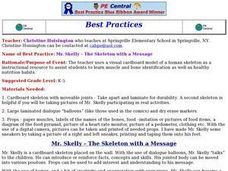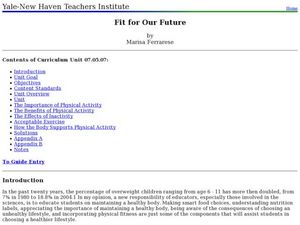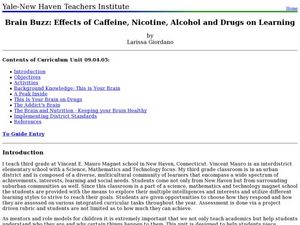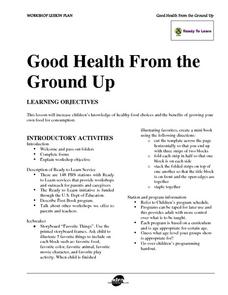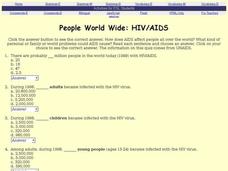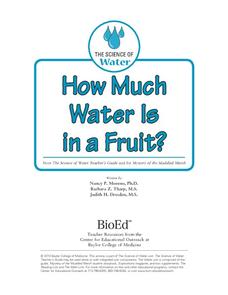Curated OER
Heart Beating Exercise
Students examine video clips and websites that explore the heart. They find and take their pulse while at rest and after exercising. They discuss foods which are good and bad for heart health.
Curated OER
Chick Chock's Pollen Problem
Students analyze how allergens effect the body and how air borne substances can effect people.
Curated OER
Health: The Skeleton with a Message
Learners identify human muscles and bones from a cardboard skeleton, named "Mr. Skelly." Using dialog balloons as props, the teacher holds up advice from Mr. Skelly, such as noting he drinks milk to keep his bones strong. The activity...
Curated OER
Nutrition: It's In Your Hands
Fourth graders use this activity to focus on their health, nutrition and the state of the environment. In groups, they examine the various types of land, water and air pollutants and compare and contrast a food chain with and without a...
Curated OER
Fit for Our Future
Students understand the importance of physical fitness as part of a healthy lifestyle. In this health lesson plan students create a display and presentation about what they learned.
Curated OER
Autism – What Is It?
Students create a poster about expected development versus observed behavior of a child with autism. In this health lesson, students describe the signs of ASD. They read and analyze a simulated case study.
Curated OER
Brain Buzz: Effects of Caffeine, Nicotine, Alcohol and Drugs on Learning
Students understand how the brain functions and how they can promote a healthy lifestyle. In this health instructional activity students complete several activities including investigating how stimulates affect the brain.
Curated OER
Fable of the Fainting Goat
Second graders explore animal life by reading children stories in class. In this goat fable lesson, 2nd graders read several books which describe the different myths and folklore about goats. Students identify the needs of living animals...
Curated OER
Good Health from the Ground Up
Students examine healthy food choices and the benefits of growing their own food for consumption. They read the story "Favorite Things" and illustrate 5 favorite things. Students discuss types of foods that are healthy choices and why it...
Baylor College
Crossing the Synaptic Gap
As part of a unit on the chemistry of the brain, thinkers learn how chemicals work to transmit messages between individual neurons and how controlled substances impact the synaptic cleft. They do so by playing a dice-and-card game in...
Baylor College
Drugs, Risks and the Nervous System
In cooperative groups, middle schoolers contemplate the probability of 18 different situations occurring. After they make predictions, they compare them to the actual risk factors. This eye-opening exercise demonstrates that the odds of...
Baylor College
Measuring and Protecting Skin
Several subjects are addressed within the context of a science lesson about the sun's ultraviolet rays. Elementary earth scientists consider protection of the skin with sunscreens (health), estimating and measuring surface area or an...
Baylor College
Infectious Disease Case Study
Small groups of life science learners look at Allison's symptoms and discuss a diagnosis. They use a chart of illnesses and draw symptom clues from an envelope to determine what illness she has. A lesson like this gives children an...
UNICEF
Get Real on Climate
Climate change isn't just about a warming planet; it will affect humans' health, spread of disease, changes in heat waves and droughts, and changes in storms and wildfires. Participants explore global climate change through discussions...
Curated OER
People World Wide: HIV/AIDS
In this HIV and AIDS worksheet, students answer ten multiple choice questions about the populations most affected by HIV and AIDS, the costs to aid people with the disease and the number of people affected in 1998 by the disease.
Baylor College
Serving Sizes
Are serving sizes for different foods always appropriate for what you need? In this hands-on activity, learners work in groups to estimate what one serving size of various foods are, and then evaluate their hypotheses by measuring real...
Baylor College
Breathing Machine
Take a deep breath and have your class construct working models of a lung! Using 500ml plastic bottles as the chest cavity, and balloons for the lung and the diaphragm, learners work in groups to make a model. The models help them to...
Baylor College
Hormones and Stress
As a more personal part of a unit on brain chemistry, your class discusses stressful situations and the body's response to them. They talk about how, while the reactions are initially helpful, some can be harmful to your health. Finally,...
Baylor College
Defending Against Microbes
In the preceding lesson from the unit, beginning biologists discovered that microorganisms are everywhere, so the question follows, why are we not sick all of the time? Class members read and discuss an article in small groups about...
Baylor College
Water: Post-Assessment
Very simply, the science class will discuss what they have learned during The Science of Water unit and take a multiple-choice post-assessment quiz. A few other closing activities are suggested for you to choose from, such as having...
Curated OER
The Impact of Fishing
Students explore the concept of fishing as it relates to oceans and how some fishing practices can damage the health of the marine ecosystems. In this lesson on the impact of fishing, students research the many places in the world where...
Baylor College
How Much Water Is in a Fruit?
Compare the volume of an orange to the volume of liquid that can be extracted out of it. Also compare the mass of an apple before and after it has been dried out. In both of these activities, children find that there is an appreciable...
Baylor College
Plant Parts You Eat
Plants provide a variety of delicious foods essential for human survival. In the fourth lesson of this series on food science, young scientists investigate common fruits, vegetables, and grains in order to determine which plant part is...
Baylor College
Bio Build-up
Trace pollutants through the environment in the seventh lesson of this series on the science of food. Looking at a picture of the plants and animals in an aquatic ecosystem, learners use dot stickers to represent harmful chemicals as...
Other popular searches
- Childrens Health Preschool
- Children's Health Preschool
- Childrens Health Sleep
- Childrens Health First Aid
- Childrens Health and Safety
- Childrens Health and Hygiene
- Childrens Health My Body
- Children's Health Needs
- Children's Health Body Image
- Children's Health Worksheets
- Children's Health Writing
- Childrens Health Pre K




